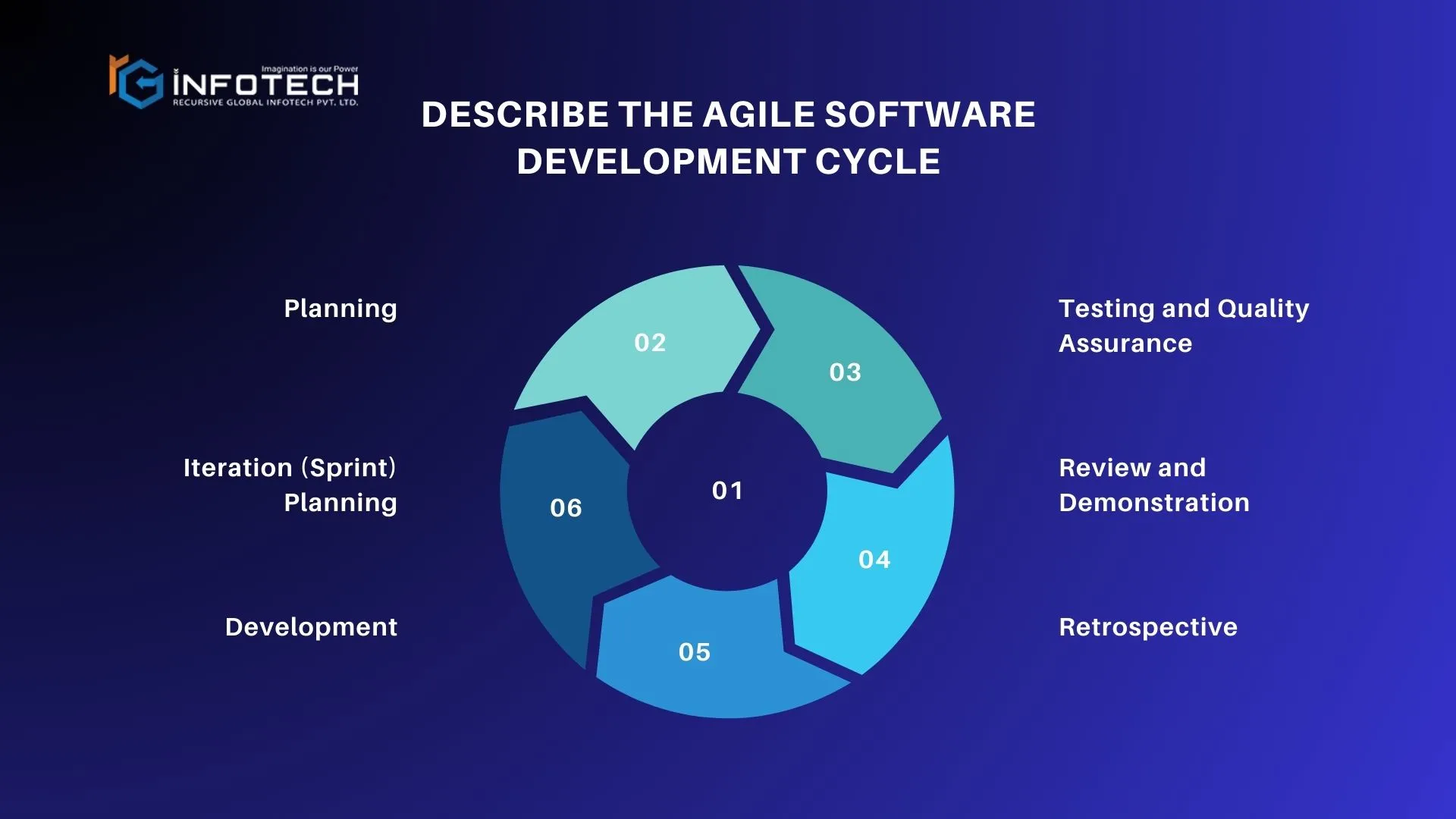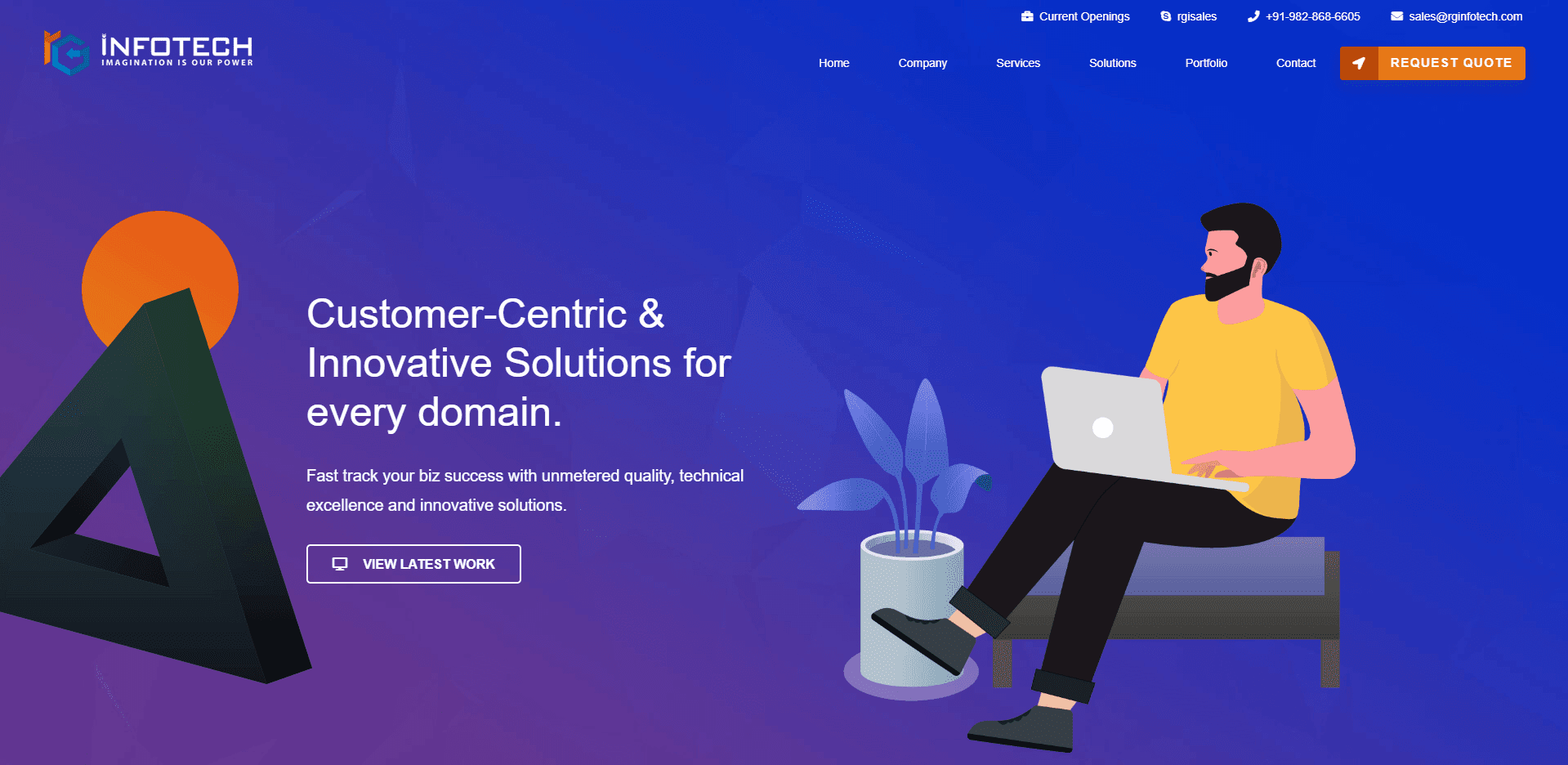Agile Software Development : Key Features & Benefits

Agile is a software development methodology that is characterized by its flexibility and pragmatic approach to delivering the final product. It prioritizes the incremental delivery of software components rather than the entire application of agile software development, often necessitating a cultural shift within organizations.
The benefits of agile software development lie in its ability to adapt to constantly changing requirements and environments while still focusing on efficiently delivering business value. By fostering a collaborative culture, agile enhances efficiency across the organization as teams work together cohesively and understand their roles in the process.
Continuous testing throughout the development process ensures that agile software development companies using agile software will provide high-quality products. This methodology facilitates prompt modifications and preemptive identification of possible problems. With its all-inclusive agile consulting and implementation services, RG Infotech helps businesses become more efficient and learn more quickly.
What is Agile Software Development?
Agile is indeed more than a specific methodology; it’s a mindset or philosophy guiding project management. Unlike traditional methodologies, agile doesn’t prescribe specific tools or processes, making it more adaptable to different contexts. Rather, Agile software development encompasses various management methodologies like Scrum, Kanban, and Extreme Programming (XP), each offering distinct frameworks for implementing Agile principles in practice.
A variety of frameworks and techniques that are in keeping with the values and tenets expressed in the manifesto for agile software and its twelve guiding principles comprise the core concept of agile software development. An agile software development agency and team can choose the best course of action and successfully traverse their unique environments by following these values and principles, which encourage flexibility and responsiveness in their agile software development approach.
Industries That Use Agile Methods
Agile approaches have been used by a number of industries to boost cooperation, optimize project management, and adapt more quickly to shifting market conditions and requirements. Among the sectors that frequently employ agile techniques are:
Software Development
Agile methodologies like Kanban, Scrum, and Extreme Programming (XP) originated in software development but are now widely adopted in diverse industries for improved collaboration and adaptability.
Education
Agile principles are being applied in educational settings to improve curriculum development, project-based learning, and collaborative teaching methods, enabling educators to adapt to diverse student needs and changing educational trends.
Information Technology (IT)
Agile methods extend beyond software development and are heavily employed in IT project management. They’re applied in diverse areas, like system implementation and IT service management, to enhance collaboration and adaptability.
Manufacturing
Agile principles have been integrated into manufacturing industries to optimize production processes, expedite time to market, and enhance product quality, commonly known as “lean manufacturing” or “agile manufacturing”.
Healthcare
Healthcare organizations are progressively embracing agile methodologies to refine project administration, foster teamwork among medical experts, and expedite progress in crafting medical devices and IT solutions for healthcare.
Finance
Agile methodologies are used in financial institutions for software development, risk management, compliance projects, and digital transformation initiatives to adapt to changing regulatory requirements and customer expectations.
Marketing and Advertising
Agile marketing methodologies enable marketing teams to respond quickly to market changes, test new campaigns, and optimize strategies based on real-time feedback and data analysis.
Product Development
Agile methodologies are used in various product development processes, including those in the consumer goods, automotive, electronics, and aerospace industries, to iteratively develop and refine products based on customer feedback and market demand.
Government
Government entities are increasingly embracing agile methodologies for software development initiatives, implementing policies, and driving reforms in the public sector. This shift enables more flexible and responsive governance practices to meet evolving needs effectively.
In recent years, agile methodologies have surged in popularity across diverse industries, empowering organizations to swiftly adjust to dynamic changes, foster collaboration, and deliver value to customers with greater efficiency.
Key Features of Agile Development
Here are the key features of agile software development that are necessary for successful projects:
Scrum Meetings
Scrum meetings are conducted daily, including after the completion of a sprint. Scrum, as a framework, fosters highly collaborative teamwork. Usually, these meetings are held at the start of the workday to align the team and prepare them for the day’s tasks.
Sprints
A sprint is among the fundamental features of agile software. In Agile methodology, enabling faster project delivery with minimal errors and issues. It includes breaking down the project into small, manageable parts.
Open Interaction
This is the part where an open and candid exchange regarding the project management process takes place between the team and stakeholders. The objective is to cultivate transparency throughout the process.
Review of Products and Services
This constitutes an ongoing procedure wherein the project undergoes scrutiny and any necessary adaptations are pinpointed. All stakeholders, both internal and external, participate in these reviews. This iterative process persists throughout the project’s lifespan and is conducted at regular intervals.
Agile Software Development Services
Agile software development services involve an iterative and flexible approach to software development that emphasizes collaboration, adaptability, and customer satisfaction. These services typically include:
- Agile Coaching and Consulting: It includes providing guidance and expertise in implementing agile methodologies within an agile software development company that involves imparting knowledge and training to the teams on principles and practices.
- Agile Project Management: utilizing agile frameworks such as scrum or Kanban to manage software projects, which also includes sprint planning, backlog grooming, and daily stand-on meetups.
- Custom Software Development: Creating software apps with the help of agile methodologies, with a focus on delivering incremental value to interactive development cycles.
- Agile Testing and Quality Assurance: It involves incorporating testing activities throughout the development lifecycle to ensure the quality and reliability of software products.
- Continuous Integration and Delivery (CI/CD): Deploying automated processes to integrate code changes, conduct tests, and implement software updates continuously and efficiently.
- Agile Transformation: Helping organizations transition to agile practices and cultures, including organizational transformation management, leadership coaching, and cultural alignment.
Overall, agile software development services provided by a great company are geared towards delivering high-quality software products that meet customer needs while adapting to changing requirements and market conditions.
Describe The Agile Software Development Cycle

The process of agile software development is an iterative and incremental approach to software development. It prioritizes flexibility, collaboration, and customer feedback to efficiently deliver high-quality agile software development solutions. Below are the steps of the agile software development cycle:
Planning
The Agile development cycle begins with planning, where the project team, including developers, product owners, and stakeholders, collaboratively defines the project scope, objectives, and requirements. This phase typically involves creating a prioritized backlog of user stories or features that will guide the development process.
Iteration (Sprint) Planning
The project is broken down into smaller, manageable phases called “sprints” (usually 1-4 weeks long). During sprint planning, the team selects a set of user story tasks from the backlog to work on during the spring. The team estimates the effort required for each task and commits to completing them by the end of the sprint.
Development
In this phase, the development team works on implementing the selected user stories or features according to the sprint plan. Developers collaborate closely with each other and with other team members, such as testers and product owners, to ensure that the software meets the defined requirements and quality standards.
Testing and Quality Assurance
Throughout the development process, agile software development and testing activities are performed concurrently with coding. Testers validate that the software meets the specified requirements, identify defects or bugs, and ensure that the software functions as intended.
Review and Demonstration
At the end of each sprint, the team conducts a sprint review or demonstration to showcase the completed work to stakeholders and gather feedback. This provides an opportunity for stakeholders to evaluate the software and provide input, which can inform future iterations.
Retrospective
Following the sprint review, the team holds a retrospective meeting to reflect on the sprint’s successes and challenges. The retrospective allows the team to identify areas for improvement and make adjustments to their processes and practices to enhance productivity and effectiveness in subsequent sprints.
By following these steps of development, teams can deliver software more quickly, respond to customer needs more effectively, and adapt to changes in requirements and market conditions with greater agility and effectiveness.
What are The Advantages and Disadvantages of Agility?
Agile methodologies offer several advantages and disadvantages, which can differ depending on the project you are working on, your team, and the organizational context. Here’s an overview of the key advantages and disadvantages:
Advantages of Agile:
- Flexibility: It serves as a key advantage of agile software development. Agile methodology allows for quick adaptation to constantly changing priorities and requirements.
- Customer Collaboration: Another one of the benefits of agile software is customer collaboration. Close interaction with customers ensures alignment with their needs and expectations.
- Early Delivery of Value: Incremental releases enable rapid delivery of working software.
- Continuous Improvement: Iterative cycles promote ongoing enhancements and refinements.
- Transparency: Frequent upgrades and updates provide visibility into project progress and challenges.
- Team Empowerment: Self-organizing teams foster ownership and motivation.
Disadvantages of Agile:
- Complexity: Challenges with large-scale or complex projects may arise.
- Resource Demands: The agile development approach requires significant time and resources for planning and collaboration.
- Customer Availability: Active involvement of stakeholders is crucial, which may not always be feasible.
- Scope Creep: Responding to change can lead to an expanded project scope if not managed effectively.
- Documentation: Agile methodologies often prioritize the delivery of working software over extensive documentation.
- Organizational Change: Adopting Agile requires cultural and organizational shifts, which can be challenging.
These were some of the main advantages and disadvantages of agile methodology. Although Agile methodologies provide numerous advantages for software development, they also introduce challenges and trade-offs that teams and organizations must conscientiously address to optimize their efficacy and achievements.
Conclusion
The above-provided details and information talk about agile software development. Agile methodologies empower organizations to thrive in rapidly changing and fiercely competitive business environments. Examining these factors reveals why Agile is pivotal for fostering adaptability and agility. Keep an eye out for more updates.
Frequently Asked Questions (FAQs)
Agile software development is guided by the Agile Manifesto, which emphasizes four key values:
- Individuals and interactions over processes and tools
- Working software over comprehensive documentation
- Customer collaboration over contract negotiation
- Responding to change by following a plan
The product owner is responsible for representing the interests of the stakeholders and ensuring that the product backlog is prioritized based on business value. They work closely with the development team to define requirements, provide feedback, and make decisions about the product.
Agile development promotes a culture of quality by incorporating practices such as test-driven development (TDD), continuous integration, and frequent code reviews. Quality assurance is built into the development process from the outset, with a focus on delivering working software that meets customer requirements.



 rgisales
rgisales



